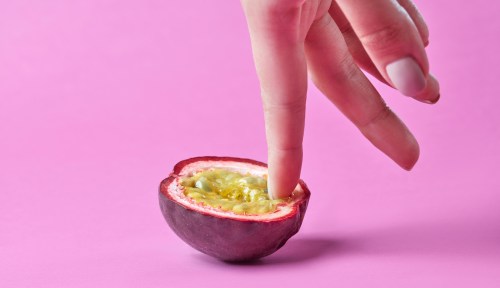Everything You Need to Know About Sexual Styles—Including How They Affect Your Relationships
Like love languages, sexual styles play a key role in how satisfied you are with your sex life and life at large.

The term “sexual styles” might first make you think of images of popular sex positions. In actuality, the phrase refers to the way in which you regard sex. Like love languages, sexual styles play a key role in how satisfied you are with your sex life (and life at large). Not sure what your sexual style is? Keep reading to learn everything you need to know about them.
What are sex styles?
Relationship and sex therapist Carolina Pataky, LFMT, the co-founder of the Love Discovery Institute in Florida, says that a lot affects how we connect on an individual level within relationships. “For some, building a personal, emotional connection comes first,” she says. “For others, it’s letting the sexual chemistry play a role in how the relationship transforms and develops.” That said, Pataky points out that a relationship’s initial amount of passion tends to last only from six months up to two years.
That’s why knowing your sexual style is so beneficial. “The key to maintaining a healthy, sexual life with your partner is to create a sexual style that fits in your relationship with you and your partner to enhance the intimacy, desire, and connection between the two to continue growing and developing a healthy relationship,” she explains, noting that it plays into the entire duration of a relationship. Find out how to discover your sexual style is, below.
Complementary
This is the most common sex style. According to award-winning sexologist Goody Howard, the complementary sexual style focuses on both partners initiating sex acts, as well as other less sexual forms of intimacy (such as meaningful communication). “It’s a balance of personal pleasure and couple intimacy where both partners are responsible for initiation and intimacy,” she explains.
Tacking onto this, Pataky says that having a complementary sex style means that both you and your partner are vocal about your sexual needs. “Couples who act on this type of sexual style value intimacy and eroticism in a balanced form and have the confidence and comfort to act out on their sexual fantasies,” she says.
Pataky says that this sexual style comes with a downside, though. “Some couples may fall into treating sex as a routine versus maintaining the passion needed to maintain a healthy sex life,” she says. “In some cases, couples who have had a baby tend to get caught up in the parenting life, losing their value within their personal life, which causes them to lose intimacy and playfulness in eroticism.”
Traditional
The traditional sexual style—which is also very popular—is all about gender roles. “The masculine partner initiates and the feminine partner is responsible for intimacy (nonsexual love),” Howard explains. (Note that anybody, of any gender, can feel masculine or feminine.)
Although this sex style is known for its stability, security, and clarity, Pataky says that it can lead to trouble down the road. If the masculine partner is responsible for initiating sexual acts, that can lead the feminine partner to feel unwanted if sex drives start to dwindle. And, since the feminine partner is “responsible” for intimate communication, it won’t be discussed until they bring it up.
Soulmate
The soulmate sexual style is best described as being best friends and partners. “Couples share intimacy and erotic pleasure at an almost cellular level that accepts the good, bad, and ugly of each person,” Howard says.
In that way, the soulmate sexual style is heavily based in validation and acceptance. “It entails sharing intimate moments and eroticism with your partner, both sides accepting each other—faults and all—as well as giving each additional validation from emotional and sexual standpoints,” Pataky explains.
In learning so much about a partner, though, the soulmate sex style can lead to de-eroticizing each other, Pataky warns. “You can end up feeling disappointed by your partner if they fail to meet unrealistic expectations, such as being unable to cope successfully if affairs occur,” she explains.
Emotionally expressive
While being emotionally open is a fantastic trait, the emotionally expressive sex style refers to passionate, yet volatile relationships. “[People with this style] use sex to resolve conflict and connect emotionally, so it burns hot, bright, and fast,” Howard explains. Pataky notes that couples with this style tend to be playful and open to sexual experimentation. “They are highly erotic and show high amounts of intensity for sex,” she says.
The problem is, when you rely solely on sex as a coping mechanism—instead of actually discussing issues that arise—these relationships often fizzle out or implode. “Couples can become too emotional, and their sexual drama can emotionally and physically drain their bond, potentially threatening their stability,” Pataky explains. “They usually use sex to avoid their issues in the relationship, which can wear their partners out both emotionally and physically.”
What’s my sexual style?
Sex styles aren’t something you choose; instead, they’re about how you show up (and react) in your relationships. “If you like to initiate and receive advances, you’re probably a complementary style; if you prefer to only initiate or only receive advances, you’re probably more of a traditional sex style,” Howard says. People who prefer to be super connected emotionally to their partners are likely soulmate folks. As for someone who enjoys passion and drama in their sexual connections? Most likely an emotionally expressive person.
Are all sexual styles compatible?
While there’s no hard and fast rule for this, Howard says that partners with the same style tend to work best together. (“If styles were to co-mingle, though, I think complementary and soulmate styles would be the most successful,” she adds.)
Sexual styles go beyond sex
Sex styles impact more than just physical acts of sex. For the soulmate style, Howard says that an emotional connection is almost as important as sex. As such, their relationship, and emotions toward it as a whole, can play into how satisfied they feel during sex.
On the opposite end of the spectrum, Howard points out that emotionally expressive folks typically avoid emotional intimacy with sex. Instead, it’s all about the act. As for complementary and traditional types, that’s where the emotional balance and engagement come into play—hence why they’re the two most popular sex styles.
Wherever you fall, Pataky says that getting to know which sexual style works for you will help you find the partnership that fulfills you the most. “[Discovering your sexual style is] ideal in creating those intimate moments special to you since not every sexual style is perfect for every couple,” she explains. “You have to discover the likes and dislikes of each partner, your desires, and your feelings and values—and select the balance of intimacy and eroticism that will enhance the sexual desires within the relationship.”
Can a person’s sexual style change over time?
Although people don’t initially choose their sex style, Howards says that, over time, they can focus on what they want and grow in that direction. “Similar to a person’s palate for food, pleasure scripts can also change and evolve throughout the lifespan,” she says. “This includes, but is not limited to sexual style.” So if you tended to be emotionally expressive or soulmate-oriented in your 20s, you might find more fulfillment in a more stable complementary or traditional bond as you age.
Ultimately, developing your sexual style goes hand-in-hand with long-term satisfaction. “When choosing a sexual style, the essential thing is to be mindful of any vulnerabilities in all the sexual types to avoid subverting a couple’s sexuality,” Pataky says—hence why she’s quick to acknowledge the downsides of each. “The critical thing is to emphasize all the strengths in your chosen sexual style and not be ashamed or embarrassed to celebrate your sexual desires with your partner as you explore your options together.”
That said, it’s also important to understand the role that sex should play in your relationships—or, at least, relationships that you hope to withstand the test of time. “Keep in mind that you want to choose a style that’s mutually accepted, facilitating satisfaction, pleasure, and sexual desires,” Pataky says. “Sexuality should have a role of about 15 to 20 percent in your relationship to help the vitality and your sexual happiness.”
One more thing
Sex styles aren’t the most heavily-researched topic in the advancement of sexual education. “I’d like to see some research on the prevalence of sexual style by community, orientation, gender identity, socioeconomic status, and so on,” Howard says. “Everything I read about this theory was from white, educated women and it was extremely heteronormative.”
Oh hi! You look like someone who loves free workouts, discounts for cutting-edge wellness brands, and exclusive Well+Good content. Sign up for Well+, our online community of wellness insiders, and unlock your rewards instantly.
Sign Up for Our Daily Newsletter
Get all the latest in wellness, trends, food, fitness, beauty, and more delivered right to your inbox.
Got it, you've been added to our email list.










